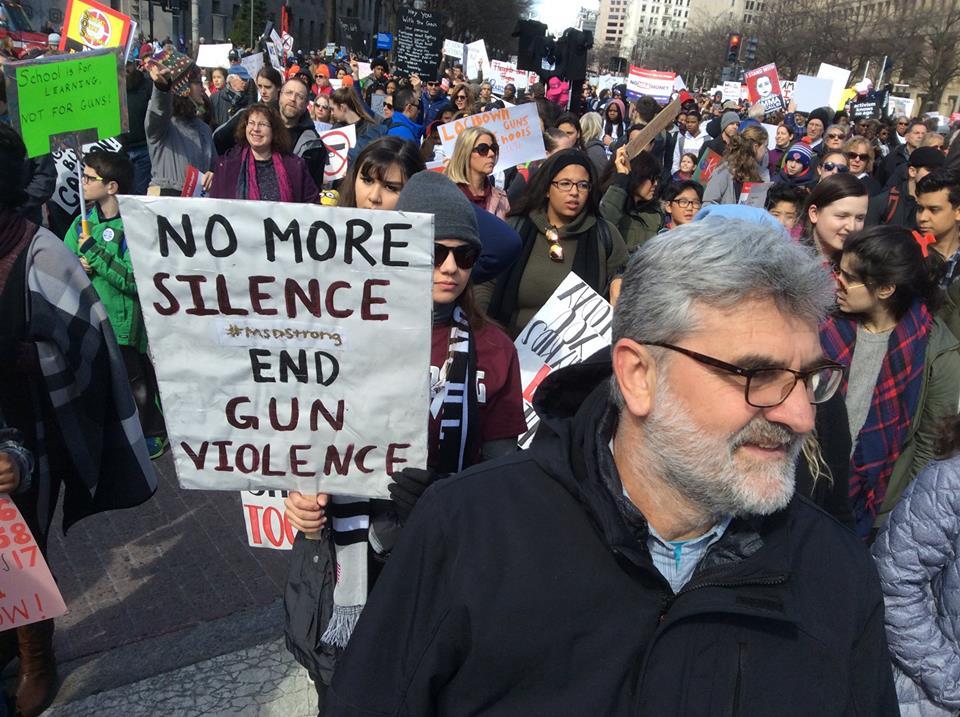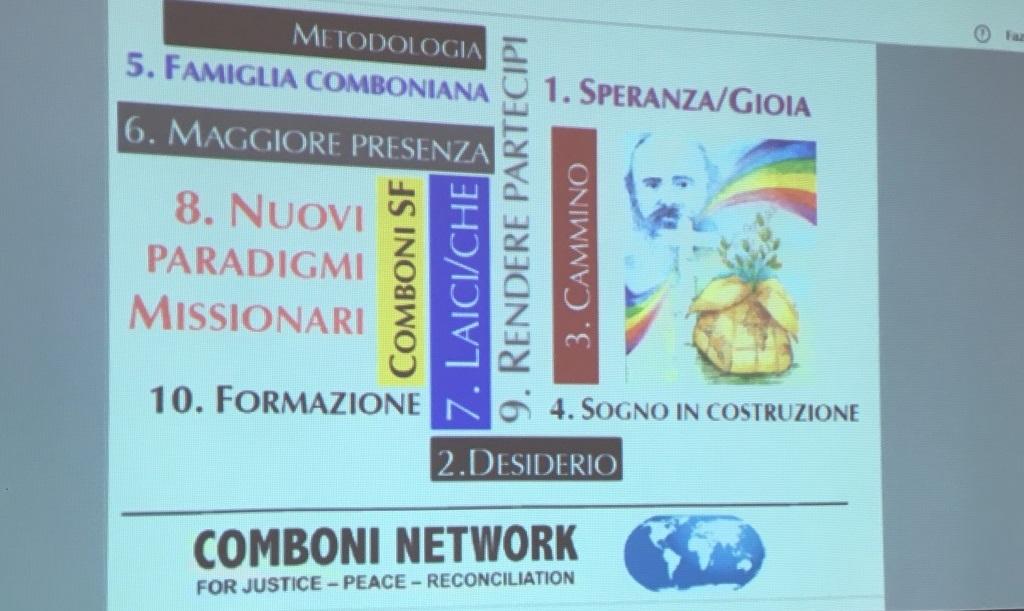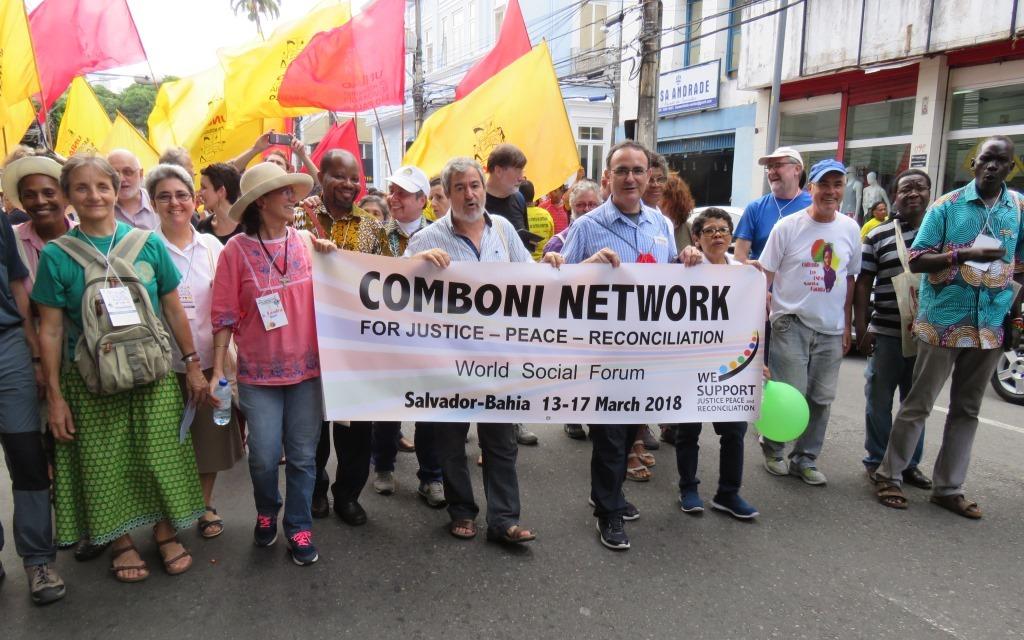Daniel Comboni
Comboni Missionaries
Institutional area
Other links
Newsletter
The Comboni Missionaries and the Comboni Sisters work are completely opposed to AFRICOM
The Comboni Missionaries work in 16 African nations and the Comboni Sisters work in 13 African nations. They beseech the State Department of US and Department of Defense to open a public forum between governments, civil society and the AU about the negative ramifications of AFRICOM.
April 2008
Comboni Missionaries and
Comboni Missionary Sisters
Offices for Justice & Peace
AFRICOM: STATEMENT OF CONCERN
The Comboni Missionaries work in 16 African nations, sharing with the people their everyday joys and also their many challenges including poverty, civil war, economic injustice, lack of adequate infrastructure and good governance, hunger, disease, famine, and more. The Sisters work in 13 African nations.
One of the most disturbing developments in today’s U.S. foreign policy strategy is the projected structure and mandate for the U.S. Military Command for Africa (AFRICOM), a flawed initiative from the U.S. Department of Defense (DoD), based in Stuttgart, Germany. The Comboni Missionaries and Comboni Missionary Sisters oppose AFRICOM because it potentially shifts the face of the disaster response and humanitarian assistance away from civilians to military personnel.
Likened to the School of the Americas, AFRICOM is to the public, a benign presence that is supposed to help bring stability, peace, and prosperity to the African continent. Upon closer inspection, it is really a military command that has been structured to give the Department of Defense (DoD) a dangerous level of jurisdiction over the State Department, USAID, and other civilian agencies. This strategy benefits special interest groups like private military sub-contractors and the oil industry, thus provoking worldwide opposition. AFRICOM would put soldiers at the front of nearly all foreign operations.
Not surprising then, African civil society and many African governments have voiced a resounding ‘no’ to AFRICOM that only confirms the need for the U.S. to re-evaluate its War on Terror and hunt for oil. In addition, local NGOs in Africa are fearful that the U.S. military will take their place in the development of their own communities.
In a recent report, AFJN purports that what the people of Africa need is not an increased military presence, but debt relief, fair trade policies, jobs, expansion of education, and improvements upon existing U.S. legislation such as the President’s Emergency Plan for AIDS Relief (PEPFAR) and the Millennium Challenge Account. If the U.S. were willing to boost the budgets of the State Department and USAID toward these ends, the sought-after stability might result. Long-term security is not generated through armed soldiers, but rather through teachers, women, youth, microfinance, and an overall fair and equitable foreign policy.
Advancing a diplomatic strategy and comprehensive U.S. foreign policy, that’s grounded in partnership with African governments, the African Union, and African civil society, is the only approach that serves the mutual, long-term interests of both Americans and Africans.
The Comboni Missionaries and Comboni Missionary Sisters beseech the State Department and Department of Defense to open a public forum between governments, civil society and the AU to ensure that every opinion is freely expressed and that the negative ramifications of AFRICOM are fully explored.
See: Africa Faith & Justice: Toward a New Concept of Security in Africa, by Beth Tuckey, tuckey@afjn.org
Signed,
The Comboni Missionaries The Comboni Missionary Sisters
North American Province USA Province
Fr. Louis Gasparini, provincial superior Sr. Mary Luz Aguilera, provincial superior
Comboni Missionaries and
Comboni Missionary Sisters
Offices for Justice & Peace
AFRICOM: STATEMENT OF CONCERN
The Comboni Missionaries work in 16 African nations, sharing with the people their everyday joys and also their many challenges including poverty, civil war, economic injustice, lack of adequate infrastructure and good governance, hunger, disease, famine, and more. The Sisters work in 13 African nations.
One of the most disturbing developments in today’s U.S. foreign policy strategy is the projected structure and mandate for the U.S. Military Command for Africa (AFRICOM), a flawed initiative from the U.S. Department of Defense (DoD), based in Stuttgart, Germany. The Comboni Missionaries and Comboni Missionary Sisters oppose AFRICOM because it potentially shifts the face of the disaster response and humanitarian assistance away from civilians to military personnel.
Likened to the School of the Americas, AFRICOM is to the public, a benign presence that is supposed to help bring stability, peace, and prosperity to the African continent. Upon closer inspection, it is really a military command that has been structured to give the Department of Defense (DoD) a dangerous level of jurisdiction over the State Department, USAID, and other civilian agencies. This strategy benefits special interest groups like private military sub-contractors and the oil industry, thus provoking worldwide opposition. AFRICOM would put soldiers at the front of nearly all foreign operations.
Not surprising then, African civil society and many African governments have voiced a resounding ‘no’ to AFRICOM that only confirms the need for the U.S. to re-evaluate its War on Terror and hunt for oil. In addition, local NGOs in Africa are fearful that the U.S. military will take their place in the development of their own communities.
In a recent report, AFJN purports that what the people of Africa need is not an increased military presence, but debt relief, fair trade policies, jobs, expansion of education, and improvements upon existing U.S. legislation such as the President’s Emergency Plan for AIDS Relief (PEPFAR) and the Millennium Challenge Account. If the U.S. were willing to boost the budgets of the State Department and USAID toward these ends, the sought-after stability might result. Long-term security is not generated through armed soldiers, but rather through teachers, women, youth, microfinance, and an overall fair and equitable foreign policy.
Advancing a diplomatic strategy and comprehensive U.S. foreign policy, that’s grounded in partnership with African governments, the African Union, and African civil society, is the only approach that serves the mutual, long-term interests of both Americans and Africans.
The Comboni Missionaries and Comboni Missionary Sisters beseech the State Department and Department of Defense to open a public forum between governments, civil society and the AU to ensure that every opinion is freely expressed and that the negative ramifications of AFRICOM are fully explored.
See: Africa Faith & Justice: Toward a New Concept of Security in Africa, by Beth Tuckey, tuckey@afjn.org
Signed,
The Comboni Missionaries The Comboni Missionary Sisters
North American Province USA Province
Fr. Louis Gasparini, provincial superior Sr. Mary Luz Aguilera, provincial superior




